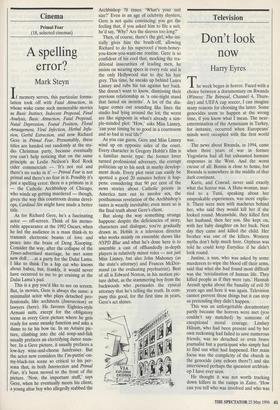Cinema
Primal Fear (18, selected cinemas)
A spelling error?
Mark Steyn
If memory serves, this particular formu- lation took off with Fatal Attraction, in whose wake came such memorable movies as Basic Instinct, Indecent Proposal, Final Analysis, Basic Attraction, Fatal Proposa4 Natal Depression, Foetal Position, Floral Arrangement, Viral Infection, Herbal Infu- sion, Gerbil Extraction, and now Richard Gere in Primal Fear. Presumably, these titles are handed out randomly at the stu- dio Christmas party, because eventually you can't help noticing that on the same principle as Leslie Neilson's Red Rock cider commercials — 'It's not red and there's no rocks in it' — Primal Fear is not primal and there's no fear in it. Possibly it's just a spelling error: there is a primate in it — the Catholic Archbishop of Chicago, who winds up getting murdered — though, given the way this courtroom drama devel- ops, Cardinal Sin might have made a better title.
As for Richard Gere, he's a fascinating actor — off-screen. Think of his memo- rable appearance at the 1992 Oscars, when he led the audience in a mass think-in to transmit electronic beams of love and peace into the brain of Deng Xiaoping. Consider the way, after the collapse of the Times-advertised marriage, he met some new doll ... at a party for the Dalai Lama. I like to think I'm a hip cat who knows about babes, but, frankly, it would never have occurred to me to go cruising at the Dalai Lama's pad.
This is a guy you'd like to see on screen. But, in movies, Gere is always the same: a minimalist actor who plays detached pro- fessionals, like architects (Intersection) or lawyers (here). He favours Eighties-style Armani suits, except for the obligatory scene in every Gere picture where he gets ready for some swanky function and asks a dame to tie his bow tie. In an Astaire pic- ture, climbing into the old soup-and-fish usually prefaces an electrifying dance num- ber. In a Gere picture, it usually prefaces a low-key wine-and-cheese fundraiser. But the actor now considers the rm-puttin'-on- my-black-tux scene so critical to his per- sona that, in both Intersection and Primal Fear, it's been moved to the front of the picture. 'Now, the important stuff,' says Gere, when he eventually meets his client, a young altar boy who allegedly stabbed the Archbishop 78 times. 'What's your suit size?' Even in an age of celebrity shysters, Gere is not quite convincing: you get the feeling that, if you asked him to file a suit, he'd say, 'Why? Are the sleeves too long?'
Then, of course, there's the girl, who ini- tially gives him the brush-off, allowing Richard to do his supercool c'mon-honey- you-know-you-want-me routine. Gere is so confident of his cool that, mocking the tra- ditional insecurities of leading men, he insists on wearing specs in every role and is the only Hollywood star to dye his hair grey. This time, he sneaks up behind Laura Linney and rubs his tux against her back. She doesn't want to know, dismissing their previous relationship as 'a one-night stand that lasted six months'. A lot of the dia- logue comes out sounding like lines the studio had lying around the lot; the worst are like signposts in what's already a sim- ple-minded plot: 'How,' asks Miss Linney, 'can your timing be so good in a courtroom and so bad in real life?'
As you can guess, Gere and Miss Linney wmd up on opposite sides of the court. Every character in Gregory Hoblit's film is a familiar movie type: the former lover turned professional adversary, the corrupt politician up to his neck in murky develop- ment deals. Every plot twist can easily be spotted a good 20 minutes before it hap- pens: considering that 90 per cent of the news stories about Catholic priests in America turn out to involve sex, the posthumous revelation of the Archbishop's tastes is wearily inevitable; even more so is the final truth about Gere's client.
But along the way something strange happens: despite the deficiencies of story, characters and dialogue, you're gradually drawn in. Hoblit is a television director who works mainly on ensemble shows like NYPD Blue and what he's done here is to assemble a cast of offhandedly in-depth players in relatively minor roles — not just Miss Linney, but also John Mahoney (as the state's attorney) and Frances McDor- mand (as the evaluating psychiatrist). Best of all is Edward Norton, in his motion pic- ture debut, as the stammering boy from the backwoods who persuades the cynical attorney that he's telling the truth. In com- pany this good, for the first time in years, Gere's act shines.


























































 Previous page
Previous page